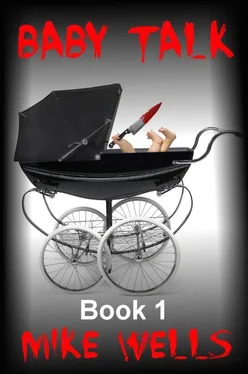Mike Wells - Baby Talk
Здесь есть возможность читать онлайн «Mike Wells - Baby Talk» весь текст электронной книги совершенно бесплатно (целиком полную версию без сокращений). В некоторых случаях можно слушать аудио, скачать через торрент в формате fb2 и присутствует краткое содержание. Жанр: Старинная литература, на английском языке. Описание произведения, (предисловие) а так же отзывы посетителей доступны на портале библиотеки ЛибКат.
- Название:Baby Talk
- Автор:
- Жанр:
- Год:неизвестен
- ISBN:нет данных
- Рейтинг книги:5 / 5. Голосов: 1
-
Избранное:Добавить в избранное
- Отзывы:
-
Ваша оценка:
- 100
- 1
- 2
- 3
- 4
- 5
Baby Talk: краткое содержание, описание и аннотация
Предлагаем к чтению аннотацию, описание, краткое содержание или предисловие (зависит от того, что написал сам автор книги «Baby Talk»). Если вы не нашли необходимую информацию о книге — напишите в комментариях, мы постараемся отыскать её.
Baby Talk — читать онлайн бесплатно полную книгу (весь текст) целиком
Ниже представлен текст книги, разбитый по страницам. Система сохранения места последней прочитанной страницы, позволяет с удобством читать онлайн бесплатно книгу «Baby Talk», без необходимости каждый раз заново искать на чём Вы остановились. Поставьте закладку, и сможете в любой момент перейти на страницу, на которой закончили чтение.
Интервал:
Закладка:
How could Neal do the same thing to Annie?
The answer was, he could not, and live with himself. If his family hadn’t known about the situation, he might have gotten away with it, but he had made the mistake of consulting his mother about the matter. “You need to do the right thing, Neal,” she had told him, and it was quite clear what she had meant by this. When he had turned to his father, whom he hadn’t seen more than a half dozen times since elementary school, the advice Neal got was, “Do whatever the hell you want, boy. But if you’re gonna screw up your life by getting married, you’re on your own.” That meant that he would no longer help Neal with his college tuition.
In the end, against all Neal’s better judgment and his deepest wishes for his own life and his future, he had finally married Annie. No fancy wedding, no honeymoon, not even any wedding rings—he couldn’t afford them. Just a little ceremony downtown at the Justice of the Peace. Afterwards, Neal went back to his dorm room and slept by himself, since they didn’t even have their own apartment then. He figured that he could make it all work, somehow.
But he had obviously been wrong.
He regretted that extra millisecond of pleasure more than he had ever regretted anything in his life.
“I love you,” Neal muttered, as he pulled the Snell van into the parking lot of his first delivery. “I doubt it, Natasha. I doubt it very much.”
CHAPTER 2
A little after eleven, in between two of his deliveries, Neal stopped at a bookstore to see if he could ease his mind about the incident with Natasha. No matter what Annie said, Neal still couldn’t believe he had imagined it.
He found a pretty young clerk working at the front desk. He asked her where the baby books were located.
“This way,” the girl said, with a knowing smile. As Neal followed her across the store, Neal puzzled over this. But by the time they reached the Family and Parenthood Section, he understood.
“The pregnancy books are right here,” the girl told him, with another little smile.
“I already have a baby,” Neal said irritably. “I just need to look something up.”
“Whatever,” she said, and briskly walked away.
“Stupid,” Neal mumbled, more to himself that to her. Why was he so embarrassed about having a kid? He was young, but so were a lot of fathers. But maybe he wasn’t embarrassed. Maybe he was just angry about it. Still angry.
He picked up a book called You and Your Newborn and flipped through the glossary, scanning for any entries that might point him to information about speech development. Annie had a whole library of similar books at home, but Neal had hardly glanced at any of them. He and Annie had completely different opinions about the basic nature of children and their process of evolving into adults. Annie was of the “blank slate” school of thinking—she regarded babies as nothing more than human computers, born ready and waiting to be programmed by their parents and by society, with no prior personality or ability to think or act on their own. As a result, she had an almost paranoid attitude about every little interaction she had with Natasha, afraid that the slightest “mistake” would screw up the poor kid for life.
In contrast, Neal believed that children come into the world already possessing a certain level of mind and spirit, with their personalities at least partially formed, and therefore are much more self-sufficient—and self-directed—than many people thought these days. His own mother had convinced him of this fact. Neal and his older brother, Kevin, were total opposites. Neal was quiet, intellectual, and somewhat introverted, whereas Kevin was rambunctious, outgoing, and barely made it through a two-year college. Their mother had always said this difference was evident long before either of them were born. Neal barely moved inside his mother’s womb, while Kevin kicked so violently that, at times, she was afraid he might do some internal damage.
Neal finally located a section in the book on speech development. He read it carefully. Most babies, it said, begin to “vocalize” between 8 and 10 months, and usually after 12 to 14 months begin to form “meaningful word combinations.” The book went on to say, in a very reassuring tone, that many children begin speech much later than this, and that such tardiness is not a reflection of a lack of intelligence, potential for success, or any other measure. Some children simply begin the speech process later than others.
Neal picked up a few other books and read essentially the same thing in them. He soon realized that he would not find the information he was truly after. It was clear that all of these books were written to pacify the Annies of the world, mothers and fathers who were worrying about when their babies “should” start talking and then what to do to correct a tardiness problem. None of the books addressed the subject of unusually early speech. And why should they? Most parents would be delighted at this development. Instead of consulting their baby books or their pediatricians, they would rush out to brag to all their friends.
Neal sighed and picked up the first book again, rereading the beginning of the passage on speech. Most children begin vocalizing at 8 to 10 months and putting together meaningful word combinations at 12 to 14 months.
“Eight to ten months,” Neal murmured.
His kid had already put together a “meaningful word combination” at five months.
What the hell did that mean?
Neal put the book back on the shelf, contemplating this question as he walked out of the store. He finally decided it could only mean two things. Either he had imagined the entire incident with Natasha, in which case he probably needed to make another trip to the bookstore, but this time to the Self Help section. Or, it meant that his theory about children coming into the world with a certain level of mind and spirit was much more accurate than he thought.
* * *
Mother and daughter were lying side by side in bed, sleeping peacefully. Annie drifted in and out of consciousness, relishing the quiet, but still disturbed by what had happened that morning with Neal. If it wasn’t so sad, it would be funny. A five-month old baby saying “I love you!” How ridiculous!
Annie raised her head and peered at Natasha’s little face. “It’s just silly, isn’t it thweetie?” She barely whispered the words, not daring to wake the child. Annie had read that it wasn’t good to interrupt an infant’s normal sleeping pattern, that it might cause insomnia or other sleeping disorders later in life.
Annie gave a quiet sigh and lay her head back down on her pillow, staring blankly out the window. A part of her wanted to believe what Neal had told her. She supposed that was normal, that every mother probably wanted to think of her baby as extraordinary or gifted. But she just couldn’t believe that Natasha had spoken. The very idea of it was ludicrous! It was only Neal’s over-active imagination, fueled by his guilt over his own attitude and behavior towards Natasha. That was the sad part. It was clear from the very beginning that Neal hated Natasha and blamed everything on her—his decision to get married (what do you expect when you get someone pregnant!), having to quit school (temporarily, so he could get a job and work for a living a support his family, like most people!), and being cut off from his father (no great loss!). The thought that he imagined Natasha telling him that she loved him was...well, just pathetic.
Annie wasn’t much of an intellectual, but she had an intuitive sense of psychology, even Neal admitted that. She had learned a lot from reading magazine articles. There was one article, called Projecting Our Hidden Selves, that had stuck in her mind, mainly because it made her think of Neal so many times while she was reading it. Today, after he had left for work, the gist of it had come back to her. The article had explained that when a strong part of your personality was repressed, it would grow more and more powerful until it forced you to look it right in the face. Annie didn’t fully understand it as she was reading it. But now, it seemed crystal clear to her. And she was certain that the process it described was exactly what had been happening to Neal.
Читать дальшеИнтервал:
Закладка:
Похожие книги на «Baby Talk»
Представляем Вашему вниманию похожие книги на «Baby Talk» списком для выбора. Мы отобрали схожую по названию и смыслу литературу в надежде предоставить читателям больше вариантов отыскать новые, интересные, ещё непрочитанные произведения.
Обсуждение, отзывы о книге «Baby Talk» и просто собственные мнения читателей. Оставьте ваши комментарии, напишите, что Вы думаете о произведении, его смысле или главных героях. Укажите что конкретно понравилось, а что нет, и почему Вы так считаете.












